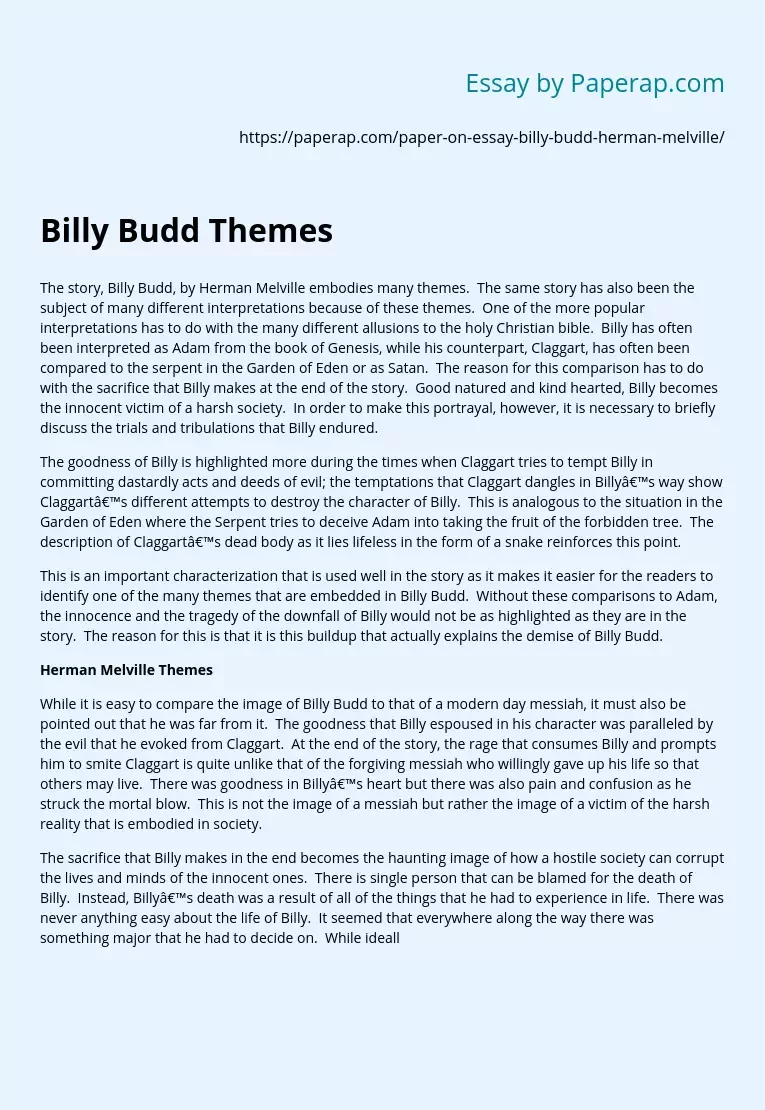Billy Budd Themes
The story, Billy Budd, by Herman Melville embodies many themes. The same story has also been the subject of many different interpretations because of these themes. One of the more popular interpretations has to do with the many different allusions to the holy Christian bible. Billy has often been interpreted as Adam from the book of Genesis, while his counterpart, Claggart, has often been compared to the serpent in the Garden of Eden or as Satan. The reason for this comparison has to do with the sacrifice that Billy makes at the end of the story.
Good natured and kind hearted, Billy becomes the innocent victim of a harsh society. In order to make this portrayal, however, it is necessary to briefly discuss the trials and tribulations that Billy endured.
The goodness of Billy is highlighted more during the times when Claggart tries to tempt Billy in committing dastardly acts and deeds of evil; the temptations that Claggart dangles in Billy’s way show Claggart’s different attempts to destroy the character of Billy.
This is analogous to the situation in the Garden of Eden where the Serpent tries to deceive Adam into taking the fruit of the forbidden tree. The description of Claggart’s dead body as it lies lifeless in the form of a snake reinforces this point.
This is an important characterization that is used well in the story as it makes it easier for the readers to identify one of the many themes that are embedded in Billy Budd.
Without these comparisons to Adam, the innocence and the tragedy of the downfall of Billy would not be as highlighted as they are in the story. The reason for this is that it is this buildup that actually explains the demise of Billy Budd.
Herman Melville Themes
While it is easy to compare the image of Billy Budd to that of a modern day messiah, it must also be pointed out that he was far from it. The goodness that Billy espoused in his character was paralleled by the evil that he evoked from Claggart. At the end of the story, the rage that consumes Billy and prompts him to smite Claggart is quite unlike that of the forgiving messiah who willingly gave up his life so that others may live. There was goodness in Billy’s heart but there was also pain and confusion as he struck the mortal blow. This is not the image of a messiah but rather the image of a victim of the harsh reality that is embodied in society.
The sacrifice that Billy makes in the end becomes the haunting image of how a hostile society can corrupt the lives and minds of the innocent ones. There is single person that can be blamed for the death of Billy. Instead, Billy’s death was a result of all of the things that he had to experience in life. There was never anything easy about the life of Billy. It seemed that everywhere along the way there was something major that he had to decide on. While ideally Billy was somebody to emulate, the experiences and the tribulations that he had to deal with were far from it. In the end, there is nobody who can be blamed for the death of Billy but society itself because it was society which made the circumstances such and even, arguably, led Billy to his demise.
There are no heroes in real life. There are only those people who live their lives fully hoping that they can make a difference in this world. The story of Billy Budd is about one of those individuals who live his life the only way he knows how yet is condemned by those who envy him. As the Captain claimed, he was a good man who was condemned by bad law. Billy may not be the hero that the world is looking for but he certainly ranks as one of those men who is worthy of respect and admiration.
Billy Budd Themes. (2019, Dec 05). Retrieved from https://paperap.com/paper-on-essay-billy-budd-herman-melville/

